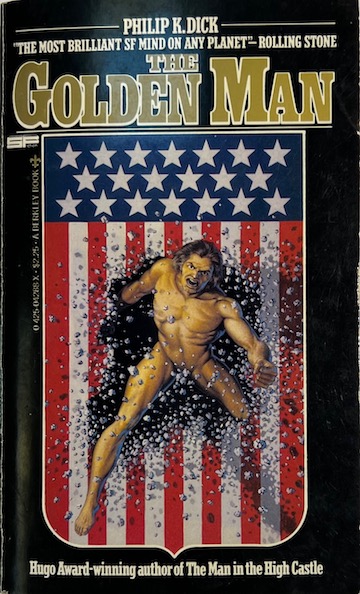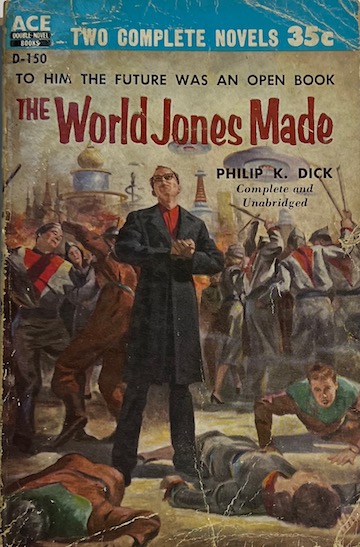Part 9 Philip K Dick 1971 Interview

James Holmes: Okay. I would be really interested to know what a typical day for you was when you are working. Like what time do you get up, how many hours do you work, you know. Do you work regularly, sporadically, do you
Philip K. Dick: I only work—
James Holmes: You know, how many—
Philip K. Dick: Under two circumstances. One, when I absolutely have to by dire necessity and even then I hardly do it. And when I am inspired which is once in a while. Then I work all the time, night and day until I finish whatever I am working on.
James Holmes: How many drafts of the work do you do?
Philip K. Dick: The last book I did, I did nine complete drafts from start to finish.
James Holmes: Nine complete?
Philip K. Dick: Yeah.
James Holmes: The ninth one was the one you sent to the publisher and that was what he published?
Philip K. Dick: I never sent it off. After doing nine complete drafts, that is like nine novels, I was just too tired to start typing up the final draft. You know, what they call the top copy craft and I couldn’t do it. I was just too tired. I had read the dialogue over and over again like day and night. I lie in bed at night and I think of a couple of sentences of the dialogue and I knew which page and which paragraph to insert them in from memory. I memorized the whole book so I never typed it up and I never sent it off.
James Holmes: So—
Philip K. Dick: It has never been sent off.
James Holmes: It hasn’t been published?
Philip K. Dick: No.
James Holmes: Was that… Does that describe adequately… You want to put that up a little close? Just a little bit.
Philip K. Dick: It’s little getting put.
James Holmes: Well, was that a good book? I mean, was it a memorable book?
Philip K. Dick: Yes. It is a very fine book and if it had not been really good to start with, I wouldn’t have gone go on and on. I don’t know what I would have done. I mean, maybe it was not as good as I thought. I just kept thinking that it was worth refining and refining. The thing is, we were talking about it before… Or I was talking about my obsessive preoccupation with reality versus illusion.
James Holmes: Uh-hmm.
Philip K. Dick: And then I was really asking the question what is real rather than stating anything as to what was real. This was an attempt to state what I thought was real. I wanted to get it right because to me, it is fairly mild as a responsibility to ask a question like what is real and tremendous responsibility to state what is real. In a way, I didn’t want ever to state it but finally I said, maybe I should. After rewriting it again and again, I still was tired but I could have had somebody else to type it up. It was all ready to be typed up. I never really had anybody else to type it up because in a way, how can you state what is real? I mean, the book could go on and be revised forever.
James Holmes: Uh-hmm.
Philip K. Dick: That as my idea what is real, changes. I could take the manuscript back, I don’t know have the manuscript here and I could rewrite it again. Then when I got it finished, I could rewrite it again. In a way, it can never be finished.
James Holmes: Well…
Philip K. Dick: Maybe it never should be.
James Holmes: Well if it is reality it could be a good mirror wouldn’t ever get done.
Philip K. Dick: Yeah, I thought even of having somebody else go over it and maybe do a final draft one. Maybe it should be a group thing.
James Holmes: Do you think it will ever get published?
Philip K. Dick: Yes. Definitely. Because if I were to croak right now, it will be published as it is.
James Holmes: Uh-hmm.
Philip K. Dick: It would cease at the moment I ceased which is the best I could offer.
James Holmes: Do you think that is the way it will be published?
Philip K. Dick: No. I am going to work on it again.
James Holmes: Oh.
Philip K. Dick: I am going to get it right.
James Holmes: Well, do you have any books in the works or any ideas or where are you heading? You know, where is your head at now? I mean, what is… What are your feelings about, you know…
Philip K. Dick: Stating what I think is real. Going on with what I did in that book which is called Flow My Tears, the Policeman Said. Which is a combination of a song by John Dowland from his sixth, 1599 lute book plus a modern type Harlan Ellison thing. I am going on with it. I will try to say what I think it was real. Only now, instead of working on that book over, I am trying to do a further work. Subsequent work. Like a children’s story that I just finished.
James Holmes: Yeah, could you tell us about it?
Philip K. Dick: The children’s story?
James Holmes: You don’t have to if you don’t want to.
Philip K. Dick: Oh, well I’m uh… Oddly enough, I have the manuscript here in my pocket. No, in a way I couldn’t. Later on, I might read you a couple of sentences from it. But even that is not finished. Even that should be revised for the same reason as the novel. You can’t… Like if I ask the question what is real? For approximately 20 years in my writing, I sure should answer the question over a long period of time. Because if I can state it in one book, first of all, what am I going to do next week?
James Holmes: [laughs]
Philip K. Dick: As opposed to, what is real revisited? Or son of what is real? What is real meets the wolf man. I mean I would be finished as a person, as a writer. And it couldn’t be done anyway. Because let us say next week… Furthermore, not only with that completely real and the complete description of reality but these things are real too and a further version, and so forth. Which would be proper.
James Holmes: This is your own reality that you are talking about? Or are you talking about the reality that everyone generally conceives as real? Is this a subjective reality or-
Philip K. Dick: No. I think this is objective.
James Holmes: The objective reality?
Philip K. Dick: Something that I said could not be done for years. Perception of an objective reality right. And not just a subjective world which differs from person to person. I mean, this was my whole basis, my whole viewpoint. Is that there are only individual subjective realities? A multitude of individual truths that is verities for only one individual. One truth, one person. Now I feel there is something that transcends that. Some objective reality. The koinos kosmos of Heraclitus. Shared reality. I think it exists. I think I have contacted it. I think I have got it on paper to a certain extent. I think I can get it down better and that is what I am trying to do.
James Holmes: Hmm… How do you just you know, what is it like? Could you describe it?
Philip K. Dick: Yes, you get billed for it at the end of the month.
James Holmes: [laughs]
Philip K. Dick: And if you don’t pay the bill, something happens. That’s it right there. That’s not all of it, that is part of it. I mean, in a way you can reduce it to a couple of aphorisms and that way you can talk about it forever. I mean it is like some of the things in the New Testament like the first should be the last, he that loses his life shall save it. You can reduce it to that and that is about all you can do. Or you can go on and on like Ecclesiastes. You never stop. I am doing both. The aphorisms and then the endless titanic world novel. Neither one would probably sell… although the novel is under contract to Doubleday, have already been sold.
James Holmes: Oh?
Philip K. Dick: My letters to Doubleday describing it caused them to sign the contract without seeing it.
James Holmes: [laughs] Is that…
James Holmes: That’s good for a novelist.
Philip K Dick: Yes, it’s good, good business. For all I know, it doesn’t exist. Now, this is something that occurred to me one time, because it’s been a year since I signed the contract and they’ve never seen a page of the novel. For all I know, I was shucking them, there is no novel, and yet they’ve paid several payments on them. That’s really strange. So, I should get out a copy, my carbon of those letters and see what I said.
James Holmes: Oh, you don’t know and you don’t remember what you said?
Philip K Dick: I remember I started to describe it and then all of a sudden I said oh and hear a four-letter word. I can’t describe in a letter. If I could, I wouldn’t have had to write the novel, and they said that’s when they made the contract, when I couldn’t describe it in the letter. That’s very Zen. That represents a failure on my part to be able to write a synopsis of the novel or even a description, convinces them that it was good. See, normally, they will sign a contract only on the basis of a synopsis and a few sample chapters.
James Holmes: Yeah.
Philip K Dick: I couldn’t do it. They said it’s a perfect novel; the only perfect novel ever written.
James Holmes: [chuckles] You’ll go down in history.
Philip K Dick: That’s what I said, too, except that part did not sell. That’s when I used that four-letter word.
James Holmes: If you have— Oh you—
Philip K Dick: Just thinking of Beethoven trying to describe the 9th symphony to his publisher, which I guess was Diabelli; Dear Mr. Diabelli, Well, I finished the 9th Symphony, and man it sure is– and the word was the same four-letter word. How much will you give me for it?
James Holmes : [laughs]
Philip K Dick: Diabelli, “The same as usual.”
James Holmes: [laughs]
Philip K Dick: “Not as much as you want, Mr. Beethoven.” I don’t know. I really should get a carbon of that out, because when I wrote the letter, I just finished the 9th version, the 9th draft, and at that point, I thought it was finished. I really did. I thought I did it, I got it down. Perfect reality, you know? This has never been done, but somehow I got it down. Clickety, click, click. “Dear Mr. Publisher, Guess what I just did,” and he sends back, all these funky-looking– a cigar coupons, civil war money and neoprene checks, but I convinced him. I wonder what’s he gonna say 10 years from now, and he still hasn’t seen it. Incidentally, I called him about four months ago and cashed some more money on the same novel, and I said, “By the way, I am typing it up now, sir.” He said, “I don’t care. I don’t care when we get it. It’s just, as long as it’s what you said it was, even if it takes 10 more years.” That appealed to me because I wasn’t typing it up. I said, “Okay, I will slow down the job of typing it up.”
James Holmes: [laughing] If you had a chance, and let’s say that you’ve got the chance now, to talk to, let’s say, 5 to 10,000 people over a radio, what would you say to them?
Continued in:
Part 10 Philip K Dick 1971 Interview

